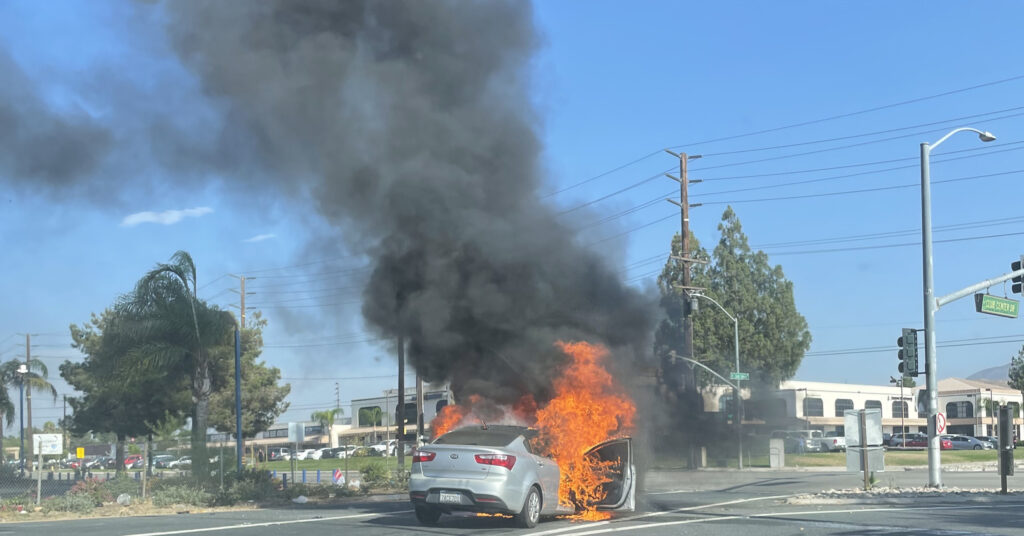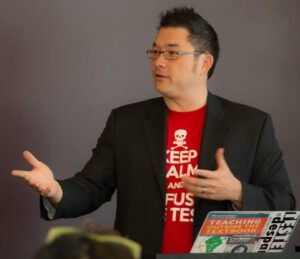By Wayne Au

It was almost 7 p.m. when the text came in. “Hello Dr. Au. I’m the assistant superintendent of the District. I need to speak to you right away regarding tomorrow’s presentation. Please call me.”
Several months ago, I had been approached by a college roommate (who had become a teacher and principal) to present at a conference organized by a racial justice lead at a school district in Southern California’s Inland Empire — that region east of Los Angeles County that includes parts of both Riverside and San Bernardino counties. They wanted me to cover some basic concepts in racial and social justice education for their teachers. The trip had already been approved by the school board. I had flown down and was already staying at a hotel, ready to make my presentation the next morning.
Earlier that evening, my college roommate had taken me to a restaurant so we could eat and catch up on old times. On the drive to the restaurant, as we approached a freeway off-ramp, we noticed black smoke billowing from some spot farther down the road. After creeping through traffic, we came upon a car sitting on the street, engulfed in flames. It was a sign of things to come.
Sitting in my hotel room looking at the assistant superintendent’s text, my curiosity was piqued. I’d never gotten a text from a district office, let alone about one of my presentations. I called the assistant superintendent to hear what they had to say. The conversation left me reeling.
They started off by apologizing for the lateness of the call and conversation since I was supposed to speak to about 200 district teachers at 8:30 a.m. the next morning, but that they had some issues with my presentation slide deck.
Before talking about their problems with my presentation, they wanted to let me know that they were Black, that they agreed with everything in my slides, and that they knew what I was saying was all true. But, they added, the teachers and the community were not ready for what I wanted to say.
My presentation opened with slides about conservative attacks against critical race theory, diversity, and LGBTQ+ content and communities across the country (especially Florida). The assistant superintendent informed me, in their opinion, all of that needed to be cut. They also said that my slides on supporting trans and queer students and slides about teachers and students organizing against injustice in schools needed to go.
They said they were open to most of the principles of teaching for social justice I collated in part from Rethinking Schools’ “Creating Classrooms for Equity and Social Justice,” which include being “grounded in the lives of students” and “culturally and linguistically sensitive.” However, they thought that some of the ones toward the end of my list — like how our teaching should be “rooted in an anti-racist struggle over content, including the critique of Eurocentric school knowledge” and “celebrating social movements and the fight against nativism, xenophobia, and white supremacy” — should be removed.
The assistant superintendent also did not like the Rethinking Schools/Zinn Education Project “Racial and Gender Justice Scavenger Hunt” activity I had planned to do as part of my keynote and said it also needed to be cut. They added that they did not approve of some of the framework for K–12 Ethnic Studies that I wanted to present.
After telling me I needed to slash more than half my presentation, the assistant superintendent apologized again for both the lateness of this request and for their leadership team not checking with them about it beforehand. They closed their comments by telling me that the district would honor my payment, even if I couldn’t make the necessary changes and needed to cancel my presentation.
Triggered and with my anxiety rising, I said I needed some time to think about it and get back to them. Meanwhile, my 13-year-old son, listening on speaker phone, was excitedly jumping around the room, buzzing with disbelief over what he just heard.
I was flabbergasted. I’ve been attacked by right-wing conservatives before, but I’ve never been censored by a public school district. I did not know what to make of the situation.
To have my work be so brazenly censored on political grounds, although not surprising in this historical moment, was a humbling experience. I know that as a professor, educator, author, and speaker, I hold privilege and power, all of which was being pulled away by this school district.
Because the district offered to pay my fee anyway, I was pretty sure they did not want me to present at all.

Canceled, Censored
Fumbling for how to make sense of it all, I contacted the local folks who had arranged for me to come present. Both were shocked, confused, and apologetic. They had been told, repeatedly, about the district’s commitment to racial justice and doing the work of helping teachers better serve the Black and Brown students in the district. Both had also seen my presentation slide deck, and while they knew that some of the content would be a stretch, they felt their teachers were ready.
A large part of me wanted to just pull out of the presentation, pack my bags, and head home. At this point I was deeply and personally offended. In my head, my own ego and hubris exclaimed, “I’m a full professor and former public school teacher who is well-published and well known for my work in anti-racist, multicultural, pro-justice education. I get invited to present to parents, teachers, and academics around the country and around the world. Who are they to tell me my presentation is not appropriate for the audience? Who are they to assume that I can’t handle a more conservative audience?” I thought to myself, if they were going to treat me like this, they didn’t deserve my presentation anyway.
Despite the assistant superintendent’s response, the local organizers argued that I should stay, that I’d have 200 teachers in front of me who would benefit from my presentation, even if it was whitewashed and watered down. Ultimately, I agreed with them and decided to see if I could appease the district and still do my presentation.
I texted the assistant superintendent: “OK. I’ve thought about it and talked with the local organizers. I’m still going to present. I will cut most but not all of what you requested. The activity will be done without any changes. The frameworks from Rethinking Schools and Ethnic Studies need to stand as is, too. They exist as their own things. Will that work for you?”
Their reply: “Can you send me a revised presentation? I don’t think the activity is appropriate. Thank you for your consideration.”
Shocked and offended (again) at the labeling of the “Racial and Gender Justice Scavenger Hunt” as not “appropriate,” I responded via text: “I disagree about the activity. I’ve done it many, many times with K–12 teachers. I’m not comfortable with needing to submit slides for review. It is ultimately manifesting as censorship, and I’m sure the district doesn’t want to operate that way.”
The assistant superintendent’s reply came quickly: “If you cannot submit the slides and remove the activity I understand but you will not be able to present tomorrow. I apologize for any inconvenience.”
Again, I consulted the local organizers. What was I supposed to do? It was 8 p.m. the evening before my presentation. Was I supposed to come up with an entirely new presentation, submit it for review by the district, and risk them telling me it was still inappropriate after putting in a bunch of extra, last-second labor?
The local organizers were at a loss and didn’t know what to do. I told them I had one last-ditch thing to try so I could at least do some good work with their teachers.
I texted the assistant superintendent: “OK. No slides at all then. Will that work?”
Their reply: “I need to know the content. Thank you.”
That was it. In the end, they needed to control my speech. I told the assistant superintendent I could not submit to their requirements, and my talk was officially canceled and ultimately censored. Sadly, the person who organized my visit was formally reprimanded by the district, and a disciplinary letter for not communicating with leadership was put in their file.
The Fight Continues
Although I was initially surprised by the whole incident, I shouldn’t have been. As the Los Angeles Times reported, several Southern California school boards have recently been targeted by conservatives seeking to advance their politics in local arenas. For instance, despite failing to pass state laws requiring districts to tell parents if a student’s reported gender is different from their birth gender, right-wing politicians and activists have found success passing similar policies in districts like Chino and Murrieta. These same conservative activists have pushed back against LGBTQ+ training for teachers, curriculum aligned with the state’s diversity requirements, and a law making it a misdemeanor to threaten or harass school officials.
I suspect that the censoring of my talk had to do with the recent election of some conservative school board members who have clamped down on the district, especially during a tense negotiation with the teacher union. I also learned that the school board had turned down federal Title I money altogether — which has resulted in questions about funding equity programs for a district whose students are mostly poor and mostly Black and Brown.
My guess is that, even if they agreed with my presentation, the assistant superintendent was either under pressure from conservative school board members or they were so nervous that something I might say could be made public and draw the wrath of conservatives that they would rather censor my speech entirely. Either way, it made for a surreal experience, and highlighted the rise of neo-fascist attacks on educational and social justice.
Hopefully, the story isn’t quite over. I’ve been in conversation with the local organizers, and it turns out that some teachers are curious about my censored presentation. They want to see and learn about the contraband content I wasn’t allowed to bring into their district, and so we hope to smuggle it in through a remote presentation. It might be little consolation, but every small act of resistance grows and amplifies the broader struggle for justice.
Author’s note: I’m being vague in some of the details of this story and I edited some details of the texts from the assistant superintendent to protect the local organizers from retaliation.
